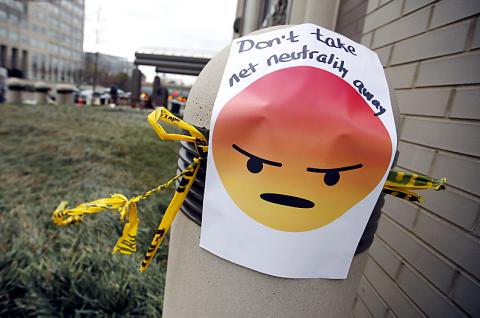The US Federal Communications Commission (FCC) on Thursday repealed former US president Barack Obama’s “net neutrality” rules, giving Internet service providers like Verizon, Comcast and AT&T a free hand to slow or block Web sites and apps as they see fit or charge more for faster speeds.
In a straight party-line vote of 3 to 2, the Republican-controlled FCC junked the long-time principle that all Web traffic must be treated equally. The move represents a radical departure from a decade of federal oversight.
In recent months, protests have erupted online and in the streets as ordinary Americans worry that cable and telephone companies will now be able to control what people see and do online.

Photo: AP
On Thursday, about 60 protesters gathered in the bitter chill in Washington to protest the FCC’s expected decision.
The broadband industry has promised that the Internet experience for the public is not going to change, but its companies lobbied hard to overturn the rules, contending they are too heavy-handed and are discouraging investment in broadband networks.
“What is the FCC doing today?” said FCC Chairman Ajit Pai, a Republican. “Quite simply, we are restoring the light-touch framework that has governed the Internet for most of its existence.”
The FCC vote is unlikely to be the last word.
Opponents of the move plan legal challenges, and some hope to make it an issue in next year’s midterm elections. There is also some hope that Congress might overturn the FCC decision.
Civil liberties organization Demand Progress spokesman Mark Stanley said there is a “good chance” Congress could reverse it.
“The fact that Chairman Pai went through with this, a policy that is so unpopular, is somewhat shocking,” he said. “Unfortunately, not surprising.”
Under the new rules, the Comcasts and AT&Ts of the world would be free to block rival apps, slow down competing services or offer faster speeds to companies that pay up. They just have to post their policies online or tell the FCC.
The change also eliminates certain federal consumer protections, bars state laws that contradict the FCC’s approach, and largely transfers oversight of Internet service to another agency altogether, the Federal Trade Commission.
FCC Commissioner Mignon Clyburn, a Democrat appointed by Obama, lambasted the “preordained outcome” of the vote that she said hurts small and large businesses and ordinary people.
She said the end of net neutrality hands over the keys to the Internet to a “handful of multibillion-dollar corporations.”
With their vote, the FCC’s Republican commissioners are abandoning the pledge they took to make a rapid, efficient communications service available to all people in the US, without discrimination, she added.

MAKING WAVES: China’s maritime militia could become a nontraditional threat in war, clogging up shipping lanes to prevent US or Japanese intervention, a report said About 1,900 Chinese ships flying flags of convenience and fishing vessels that participated in China’s military exercises around Taiwan last month and in January last year have been listed for monitoring, Coast Guard Administration (CGA) Deputy Director-General Hsieh Ching-chin (謝慶欽) said yesterday. Following amendments to the Commercial Port Act (商港法) and the Law of Ships (船舶法) last month, the CGA can designate possible berthing areas or deny ports of call for vessels suspected of loitering around areas where undersea cables can be accessed, Oceans Affairs Council Minister Kuan Bi-ling (管碧玲) said. The list of suspected ships, originally 300, had risen to about

DAREDEVIL: Honnold said it had always been a dream of his to climb Taipei 101, while a Netflix producer said the skyscraper was ‘a real icon of this country’ US climber Alex Honnold yesterday took on Taiwan’s tallest building, becoming the first person to scale Taipei 101 without a rope, harness or safety net. Hundreds of spectators gathered at the base of the 101-story skyscraper to watch Honnold, 40, embark on his daredevil feat, which was also broadcast live on Netflix. Dressed in a red T-shirt and yellow custom-made climbing shoes, Honnold swiftly moved up the southeast face of the glass and steel building. At one point, he stepped onto a platform midway up to wave down at fans and onlookers who were taking photos. People watching from inside

Japan’s strategic alliance with the US would collapse if Tokyo were to turn away from a conflict in Taiwan, Japanese Prime Minister Sanae Takaichi said yesterday, but distanced herself from previous comments that suggested a possible military response in such an event. Takaichi expressed her latest views on a nationally broadcast TV program late on Monday, where an opposition party leader criticized her for igniting tensions with China with the earlier remarks. Ties between Japan and China have sunk to the worst level in years after Takaichi said in November that a hypothetical Chinese attack on Taiwan could bring about a Japanese

The WHO ignored early COVID-19 warnings from Taiwan, US Deputy Secretary of Health and Human Services Jim O’Neill said on Friday, as part of justification for Washington withdrawing from the global health body. US Secretary of State Marco Rubio on Thursday said that the US was pulling out of the UN agency, as it failed to fulfill its responsibilities during the COVID-19 pandemic. The WHO “ignored early COVID warnings from Taiwan in 2019 by pretending Taiwan did not exist, O’Neill wrote on X on Friday, Taiwan time. “It ignored rigorous science and promoted lockdowns.” The US will “continue international coordination on infectious